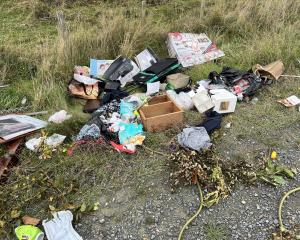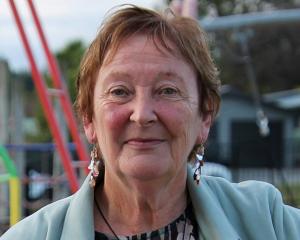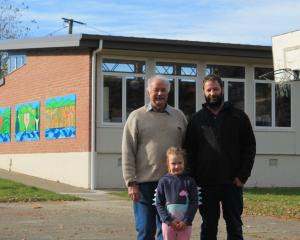Picture rolling waves crashing on to tawny beaches and blue skies smeared with white smudges of cloud, with a lone figure walking along the beach with a dog.
Or a deserted beach with a sky and waves tinged with pink and purple clouds as the sun sets on a mild autumn night, and it is no wonder Kaka Point is still a favoured holiday spot for Southern residents.
It has been 10 years since I was last at Kaka Point, and to say much has changed would be an understatement.
It was a favourite holiday spot for my aunt and uncle from Gore, and my brother and I often joined our cousins there on a week-long break. From memory, most of the homes were the typical South Island-style holiday cribs by the beach. Generally of weatherboard construction, with a small porch or sunroom, a rickety clothesline somewhere in the backyard, there were faded paperbacks scattered around a comfortable, well-worn interior.
The corner shop sold enough kinds of lollies and ice-blocks to satisfy most children's tastes, as well as the usual bread, milk, newspapers and basic supplies. Walking past the shop now, it seems smaller than I remembered, and next door is a restaurant that was not there before. Every few minutes a campervan, or rental car passes through, some stopping for occupants to leap out, posing for photographs with fellow travellers or taking snaps of the beautiful scenery that surrounds this small town.
For some such as Bruce Murray, Kaka Point has been home for generations. The Murray family farm lies a few minutes south of Kaka Point, on the way to Nugget Point.
The farm has been in the family for three generations, and sprawls over more than 600ha with 250 beef cows and 1400 breeding ewes.
Mr Murray is often asked to sell sections of his farm to people wanting to build cribs or a house, as his land overlooks the bay, and somehow manages to avoid most of the easterly winds.
However, within the township itself there are "quite a few good sections for sale" he says.
But the biggest change lies in the residents themselves.
"Once I would've known everyone on the Point, and now I hardly know anyone."
He pinpoints most of the changes to the introduction of a water scheme, a service he himself does not use at his house or on the farm, as he uses rainwater off the house roof. The land needs no irrigation, and the stock is watered by two good creeks running through the farm.
He loves the scenery and living close to the sea, and says Balclutha is only a short drive away.
"You're in the town, but not in town at the same time."
And despite travelling to places such as Turkey and Dubai, Mr Murray cannot see himself leaving the family farm.
"I'll retire here and will never leave."
Others, like Balclutha resident Bill Falconer, have owned holiday homes at Kaka Point for decades.
"We don't ever regret building there but I think it would be difficult to try and build there now."
Mr Falconer built the crib about 30 years ago, starting the job at Queen's Birthday and finishing just before Christmas that same year. Back then land was on a yearly lease, and there were no sealed roads, water or sewerage.
He admits it was "pretty rough" but the people who really loved the area and really wanted to live there, did.
"When the water got put in people had to pay to stay, so some bought houses, others built newer, flasher ones and the house prices went up."
Most home-owners there have family connections to the area or old family holiday homes. They are either renovating or knocking them down and replacing them with bigger ones.
Rosa MacPherson moved to Kaka Point with her parents 40 years ago from Warepa when they bought the old corner shop and she worked there during holidays and weekends for 13 years.
She says that, in a way, the Point lost a lot of its character and uniqueness when many of the old homes were pulled down and replaced with beautiful new houses.
"The people here are lovely but there is a different feel to the town now."
She remembers that the area had a number of clubs, from cubs and scouts to sports teams, and everyone was in more than one community group. She says a lot of the clubs disappeared when the school and the church closed.
Today, the surf life-saving club is still going well, with children from other areas coming to Kaka Point to practice their skills.
But one of her fonder memories involves the several fishing boats which were based at Nugget Point, only a 10 minute drive away.
"We could meet the fishing boats as they came in and buy big bags of fish for next to nothing. That'd be our Sunday drive."
The peace and quiet the town offers is ideal, she says, but there is still much to do in the area with plenty of good walks, wildlife and there's not a downside to living there.
"I haven't found anywhere I like better yet," she laughs.
All agree that the sealed roads, newer footpaths and upgraded camping areas mark a few of the changes that draw in a larger crowd of tourists.
Prices for holiday homes peaked about two years ago.
Balclutha author Irene Sutton also grew up in Kaka Point. Her ancestors bought land in 1847 before arriving in the country on John Wickcliffe. She has begun gathering photos, documents and stories for a book she is writing on Kaka Point.
In the meantime, she is working on a book about the 100 years of the Kaitangata Fire Brigade to be finished in time for the brigade's centennial celebrations over Labour Weekend.
Much has changed in the town, she says, better roading and water making life much easier.
She agrees that many of the houses at the Point are now "mansions", a far cry from the basic homes and cribs of yesteryear.












